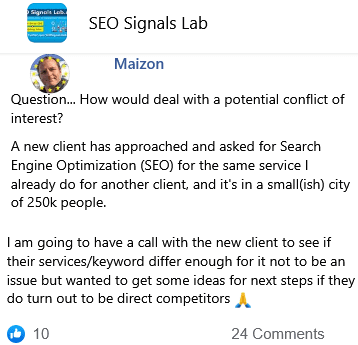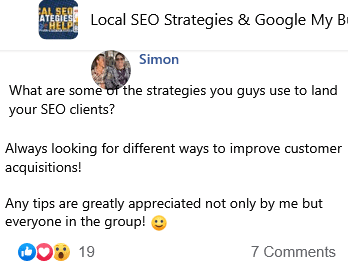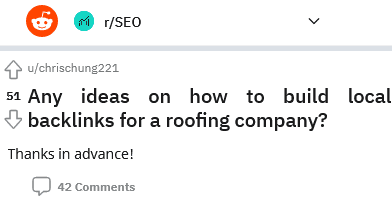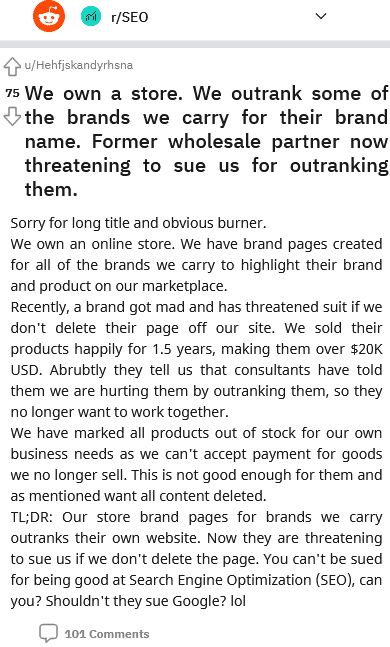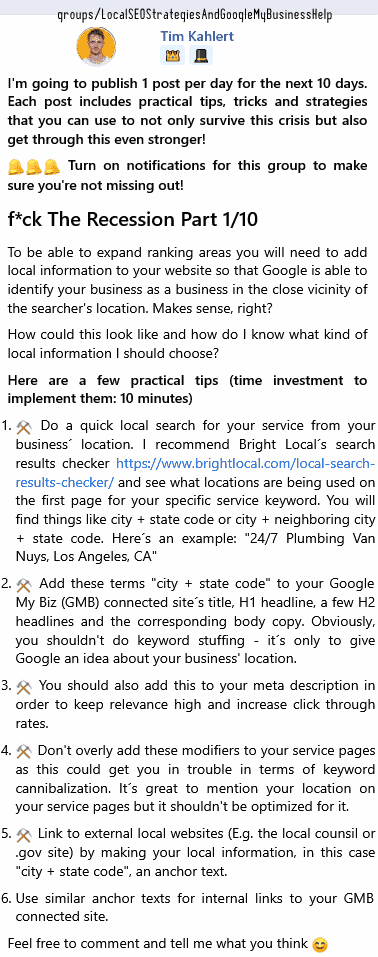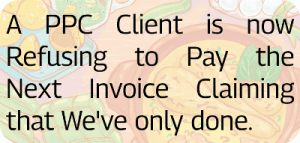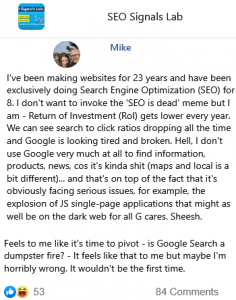Question… How would deal with a potential conflict of interest?
A new client has approached and asked for Search Engine Optimization (SEO) for the same service I already do for another client, and it's in a small(ish) city of 250k people.
I am going to have a call with the new client to see if their services/keyword differ enough for it not to be an issue but wanted to get some ideas for next steps if they do turn out to be direct competitors 🙏
10 👍🏽10
24 💬🗨
📰👈
Ah, everyone is throwing the "it depends" questions today. In your case Chris, the dependencies are around the expectations of the existing client. Have they any reason to believe or feel you are committed to supplying *only* them? That's always critical, because regardless of anything, even if they are wrong or unreasonable in those expectations, if you annoy a client you probably lose the client.
If you've never said anything that would give them any reason to expect exclusivity of your services then step 2 is to OFFER them that exclusivity, at a premium. You let them know that another company is interested, and that since you don't have an exclusive contract with them, you wanted to offer them that option first, just in case.
Basically the world is full of services that supply multiple competitors in the same market. It is entirely normal. So long as you are doing your best for each, and where possible playing to the different strengths of each, you working for both can actually be an advantage. It saves one of them wasting time and resource where the other has an unbeatable advantage of time and resources invested, and instead focus where it will count more.
There is no conflict of interest so long as you ABSOLUTELY guard the confidentiality of each client, and never, even accidentally, spill secrets to a competitor. But if your existing client is willing to compensate you for narrowing your market, by paying for exclusivity on top of paying for the service itself, that's good too.
👍🏽11
wow, amazing insight thank you Ammon Johns, had not even considered the exclusivity angle (and no it's never been discussed/implied with the client).
You're right, to outright reject the work is narrowing my market without any due compensation. That had not occurred to me at all 👌
Marty Marion 🎓 » Ammon Johns
With the UTMOST respect, I am going to take the other side on this one… if you are doing any level of Search Engine Optimization (SEO) above the most basic fundamentals, there is ZERO way you aren't learning things about the niche or subject or competitor landscape that you would NOT have known if you hadn't been working on client number 1. Thus, client number 2 in the same niche in the same city WILL get the benefit of what you learned from the work on client number 1. If I were client number 1, I would be pissed off as all hell if I found out.
Subject exclusivity is such an important topic, I think it needs a lot more discussion… not saying my opinion is the only way or even the right way, but if I were a client, there is no way I would allow my agency or consultant to take on a directly competing client in the same city.
💟4
Ammon Johns 🎓 » Marty Marion
Awesome! I hope you understand why I am absolutely delighted to discuss this further with you and welcome your argument.
Let's back-track a little to the early day of my career, mid to late '90s, because that's where I first learned this lesson and developed my answer to it. Back then, the term SEO was unknown. Regular companies did safe, regular marketing. Print, TV and Radio were known entities, while the web seemed this amateurish thing full of bearded weirdoes who seemed to be hacking the search engines (whatever those were).
So the primary market for online marketing of any sort, and the stuff that would become 'SEO' in particular, was either the micro-businesses too small to afford regular advertising and so with no choice but to 'take a punt', or those limited in many forms of regular marketing, and who tended to be forever on the cutting edge – adult, gambling, and pharma.
I drifted into marketing for the adult industry, mostly because I knew nothing much about gambling or pharma, but was quite a fan of sex. 😃 And I was pretty much a specialist in the specifics of the adult niches for about 5 years.
Alright, I'm kidding a bit. I was the guy always willing to take on any niche, not with nonsensical guarantees, but simply that any niche and any SERP is always equally competitive – you have to beat the others on page one of the Search Engine Result Page (SERP). If the client was serious, and willing to commit the resources needed, there is no niche I wouldn't take on. So I worked travel, and dating, and adult, and even a little pharma and gambling. But adult is where I built my rep first and had no shortage of clients wanting my services.
I worked for companies that had 1 database and were building and selling hundreds of front-end websites that leveraged it. They all had a global market, and they all really had the exact same product, pulling from the same few databases. Obviously, the most successful simply made up a niche specialization, and pulled the matching content from that database to highlight – but they were really all the same database behind it.
For a while, something like 90% of all the Western adult market was coming from just 3 main databases in the world, owned by the largest distributors. And I worked on *hundreds* of sites. For each one, I did what I do for any of my clients – I did a sort of SWOT analysis, and then looked to play the best move possible that played to their strengths and wherever the market had gaps. None had any complaints with my work or professionalism.
It was not all p0rnography, of course. I also worked the tangential markets, most notable being dating. Some of my dating site clients were global, some national, but effectively they were all competing in the same market at some level. Again, I gave each my best work exactly as in any other scenario – look at their business and identify their best strategic move and position. Some decided to play a niche game, some developed another Unique Selling Proposition (USP), but ultimately they were all dating sites competing for the same basic markets.
It's different to what most would think. Because as each client made their move, they *changed* the market, and therefore changed what would be the best positional move for the next. You know a thing or two about positioning, depositioning, and counter-play to know what I mean.
Of course, this is also where my belief is rooted so firmly that the single most important thing for any business is a USP. With each having a USP, each business is a unique entity, has their own path, different to any others. I simply didn't take on any client that didn't have, or wouldn't develop, a USP. I still don't.
If I hadn't taken on multiple clients in the same field, I'd have literally lost the majority of my profitable work. And they would have been unable to get SEO at all, given that back then there were far fewer SEO users around, and fewer still of those that were willing (never mind able) to take on adult, pharma, gambling, etc.
I mentioned in the previous reply that in many ways, having the same marketing agency that a rival uses can be an advantage. They know if something that looks like an open opportunity might not be, and save you a lot of wasted campaigns. It's no different to doing really good competitor analysis, except with far less margin of error.
But if the clients have each got a Unique Selling Proposition (USP), you'd be amazed at how differently their campaigns would be planned in the first place. They'd often only really 'compete' on the broadest of 'head' terms (no adult pun intended nor avoided), which generally had the worst conversion rates anyway. The long tail, which was always where the highest conversion rates were, were completely different.
💟
Marko
It is not dishonest to take two or more clients in the same vertical form the same locality.
If a client wants to have you as an exclusive service provider, than they have to compensate you with a premium for your missining opportunities.
In general, clients rarely accept to pay such premium fee.
💟👍🏽2
S. M. Fahim
If they have different sets of services, work on those areas and clearly state in your contract!
If a completely direct competitor, don't take it. You'll end up dissatisfying both and lose both clients.
Additionally, I'd let the first client know that X came to me with a bigger budget. So you might want to be aware of your competitors next steps.
Yeah that's smart, will do thanks
Maizon ✍️
Thanks all, very helpful. I shall see what the discovery call turns up and go from there.
Maizon turned off commenting for this post.
📰👈
Having 2 Local SEO Clients in the Same Business model Same City. It is Cool!
Managing Multiple Writers versus Hiring a Writer Agency or Company
An Agency Said 7 Niches Contains Most Clients: Dental, Eye Care, Hospitals, SaaS, Education, Finance, and Cannabis!
Splitting a Company in Two dedicated to each Targeted Audience
